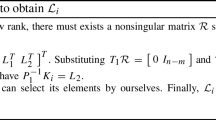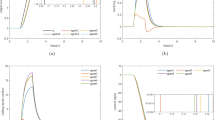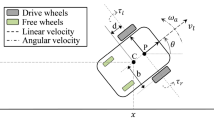Abstract
This paper studies the adaptive fault-tolerant control problem for biological systems with the invasion of alien species. Firstly, to overcome the difficulty of dealing with nonlinear terms in the system, the T-S fuzzy method is applied to obtain the T-S fuzzy biological systems. Then, an augmented matrix is developed for the T-S fuzzy system, and a sliding mode observer is constructed to estimate the state vector, sensor faults, sensor failure and external disturbances. In addition, an observer-based adaptive sliding-mode control law is designed to ensure the stability of the closed-loop biological system. Finally, a simulation example is presented to illustrate the effectiveness of the proposed method.
Similar content being viewed by others
Statement of Data Availability
The authors confirm that the data is available.
References
Z. Selyunina, S. Pliushch, and V. Leontiev, “Invasion of the muskrat (Ondatra zibethicus) into the steppes of the northwest Black Sea region,” Theriologia Ukrainica, pp. 113–119, 2019.
M. D. Regessa, “Review on the impact of invasive alien weed tree distributed in Afar regional state and some parts of Oromia region, Ethiopia,” Journal of Natural Sciences Research, vol. 10, no. 8, pp. 1–7, 2020.
Y. Zhang, Q. L. Zhang, and G. F. Zhang, “H∞ control of T-S fuzzy fish population logistic model with the invasion of alien species,” Neurocomputing, vol. 173, pp. 724–733, 2016.
Y. Zhang, Q. Zhang, J. Li, and Q. Zhang, “The bifurcation and control of a single-species fish population logistic model with the invasion of alien species,” Discrete Dynamics in Nature and Society, vol. 2014, no. 32, pp. 1–11, 2014.
Q. L. Zhang, H. X. Lu, and Y. Zhang, “Stability and Hopf bifurcation analysis for Logistic model with the invasion of alien species,” Journal of Northwest Normal University (Natural Science), vol. 54, no. 4, pp. 5–10, 2018.
F. Guo and P. Lu, “Improved adaptive integral-sliding-mode fault-tolerant control for hypersonic vehicle with actuator fault,” IEEE Access, vol. 9, pp. 46143–46151, 2021.
J. W. Zhu, C. Y. Gu, S. Ding, W. A. Zhang, and Y. Li, “A new observer based cooperative fault-tolerant tracking control method with application to networked multi-axis motion control system,” IEEE Transactions on Industrial Electronics, vol. 68, no. 8, pp. 7422–7432, 2021.
L. E. F. Ronay, J. C. Ponsart, D. Theilliol, and Y. Zhang, “LPV model-based tracking control and robust sensor fault diagnosis for a quadrotor UAV,” Journal of Intelligent & Robotic Systems: Theory & Application, vol. 84, no. 1, pp. 163–177, 2016.
B. Y. Huo, Y. Q. Xia, K. F. Lu, and M. Y. Fu, “Adaptive fuzzy finite-time fault-tolerant attitude control of rigid spacecraft,” Journal of the Franklin Institute, vol. 352, no. 10, pp. 4225–4246, 2015.
H. Ouyang and Y. Lin, “Adaptive fault-tolerant control and performance recovery against actuator failures with deferred actuator replacement,” IEEE Transactions on Automatic Control, vol. 66, no. 8, pp. 3810–3817, 2020.
Z. Q. Zuo, D. Ho, and Y. J. Wang, “Fault tolerant control for singular systems with actuator saturation and nonlinear perturbation,” Automatica, vol. 46, no. 3, pp. 569–576, 2010.
W. H. Liu, B. P. Ma, J. W. Lu, and F. Xie, “Fault-tolerant adaptive control for a class of nonlinear systems with uncertain parameters and unknown control directions,” IEEE Access, vol. 1, no. 7, pp. 8582–8590, 2018.
D. K. Lu, G. H. Zeng, J. Liu, and X. H. Li, “Fault estimation and fault-tolerant control of markovian jump system with mixed mode-dependent time-varying delays via the adaptive observer approach,” Journal of Dynamic Systems Measurement & Control, vol. 139, no. 3, 031002, 2017.
J. Fei and Y. Chen, “Dynamic terminal sliding-mode control for single-phase active power filter using new feedback recurrent neural network,” IEEE Transactions on Power Electronics, vol. 35, no. 9, pp. 9904–9922, 2020.
V. T. Yen, W. Y. Nan, and P. V. Cuong, “Recurrent fuzzy wavelet neural networks based on robust adaptive sliding mode control for industrial robot manipulators,” Neural Computing and Applications, vol. 31, no. 11, pp. 6945–6958, 2019.
H. Thanh and S. K. Hong, “Quadcopter robust adaptive second order sliding mode control based on PID sliding surface,” IEEE Access, vol. 6, pp. 66850–66860, 2018.
B. B. Ali, D. Slim, B. H. Faycal, and S. Anis, “An H∞ sliding mode observer for Takagi-Sugeno nonlinear systems with simultaneous actuator and sensor faults An,” International Journal of Applied Mathematics & Computer Science, vol. 25, no. 3, pp. 547–559, 2015.
M. T. Hamayun, C. Edwards, and H. Alwi, “Design and analysis of an integral sliding mode fault-tolerant control scheme,” IEEE Transactions on Automatic Control, vol. 57, no. 7, pp. 1783–1789, 2012.
C. Edwards, S. K. Spurgeon, and R. J. Patton, “Sliding mode observers for fault detection and isolation,” Automatica, vol. 36, no. 4, pp. 541–553, 2011.
H. Ma, J. Wu, and Z. Xiong, “A novel exponential reaching law of discrete-time sliding-mode control,” IEEE Transactions on Industrial Electronics, vol. 64, no. 5, pp. 3840–3850, 2017.
X. Su, X. Liu, and Y. Song, “Fault-tolerant control of multi-area power systems via sliding mode observer technique,” IEEE/ASME Transactions on Mechatronics, vol. 23, no. 2, pp. 38–47, 2017.
Q. Zhu, S. Mobayen, H. Nemati, J. Zhang, and W. Wei, “A new configuration of composite nonlinear feedback control for nonlinear systems with input saturation,” Journal of Vibration and Control, vo. 29, no. 5–6, pp. 1417–1430, 2022.
A. Akhenak, M. Chadli, D. Maquin, and J. Ragot, “Sliding mode multiple observer for fault detection and isolation,” Proc. of 42nd IEEE International Conference on Decision and Control, vol. 1, pp. 953–958, 2003.
Q. Zhu, “Complete model-free sliding mode control,” Scientific Reports, vol. 11, 22565, 2021.
Z. Jin, Z. Wang, and J. Li, “Input-to-state stability of the nonlinear fuzzy systems via small-gain theorem and decentralized sliding mode control,” IEEE Transactions on Fuzzy Systems, vol. 30, no. 8, pp. 2993–3008, 2022.
Y. Wang, X. Xie, M. Chadli, S. Xie, and Y. Peng, “Sliding-mode control of fuzzy singularly perturbed descriptor systems,” IEEE Transactions on Fuzzy Systems, vol. 29, no. 8, pp. 2349–2360, 2021.
Z. Jin, Z. Qin, X. Zhang, and C. Guan, “A leader-following consensus problem via a distributed observer and fuzzy input-to-output small-gain theorem,” IEEE Transactions on Control of Network Systems, vol. 9, no. 1, pp. 62–74, 2022.
Y. Zhang, Z. Jin, and Q. Zhang, “Impulse elimination of the Takagi-Sugeno fuzzy singular system via sliding-mode control,” IEEE Transactions on Fuzzy Systems, vol. 30, no. 4, pp. 1164–1174, 2022.
Z. Li and X. Chen, “Adaptive actuator fault compensation and disturbance rejection scheme for spacecraft,” International Journal of Control, Automation, and Systems, vol. 19, no. 2, pp. 900–909, 2020.
D. Yang, G. Zong, and S.-F. Su, “H∞ tracking control of uncertain Markovian hybrid switching systems: A fuzzy switching dynamic adaptive control approach,” IEEE Transactions on Cybernetics, vol. 52, no. 5, pp. 3111–3122, 2022.
D. Yang, G. Zong, S.-F. Su, and T. Liu, “Time-driven adaptive control of switched systems with application to electrohydraulic unit,” IEEE Transactions on Cybernetics, vol. 52, no. 11, pp. 11906–11915, 2022.
L. Zhang and G. Yang, “Observer-based adaptive decentralized fault-tolerant control of nonlinear large-scale systems with sensor and actuator faults,” IEEE Transactions on Industrial Electronics, vol. 66, no. 10, pp. 8019–8029, 2019.
G. Wang, M. Chadli, and B. V. Basin, “Practical terminal sliding mode control of nonlinear uncertain active suspension systems with adaptive disturbance observer,” IEEE/ASME Transactions on Mechatronics, vol. 26, no. 2, pp. 789–797, 2021.
Z. Jin, Q. Zhang, and X. Meng, “The stability analysis and control of uncertain singular biological economic system with invasion of alien species based on sliding mode control,” Journal of Intelligent & Fuzzy Systems, vol. 34, no. 6, pp. 4079–4091, 2018.
X. Feng and Y. Wang, “Fault estimation based on sliding mode observer for Takagi-Sugeno fuzzy systems with digital communication constraints,” Journal of the Franklin Institute, vol. 357, no. 1, pp. 569–588, 2019.
L. H. Chen, X. L. Huang, and S. S. Fu, “Fault-tolerant control for markovian jump delay systems with an adaptive observer approach,” Circuits Systems & Signal Processing, vol. 35, no. 12, pp. 4290–4306, 2016.
Z. Liu, A. Mohammadzadeh, H. Turabieh, S.S. Band, and A. Mosavi, “A new online learned interval type-3 fuzzy control system for solar energy management systems,” IEEE Access, vol. 9, pp. 10498–10508, 2021.
P. Liu, Q. Zhang, X. Yang, and L. Yang, “Passivity and optimal control of descriptor biological complex systems,” IEEE Transactions on Automatic Control, vol. 53, pp. 122–125, 2008.
H. Steel and A. Papachristodoulou, “Design constraints for biological systems that achieve adaptation and disturbance rejection,” IEEE Transactions on Control of Network Systems, vol. 5, no. 2, pp. 807–817, 2018.
Author information
Authors and Affiliations
Corresponding author
Ethics declarations
The authors declare there is no conflict of interest.
Additional information
Publisher’s Note Springer Nature remains neutral with regard to jurisdictional claims in published maps and institutional affiliations.
This work is supported by National Natural Science Foundation of China under Grant 61673099.
Jiawen Li received her B.S. degree in mathematics from Shenyang University of Technology, Shenyang, China, in 2016, where she is currently a graduate researcher in mathematics at the same university. Her current research interests include singular systems, nonlinear systems, multi-agent systems, and distributed control and optimization.
Yi Zhang received her B.S. degree in mathematics from Beijing Normal University, Beijing, China, in 1993, and an M.S. degree in mathematics and a Ph.D. degree in complexity theory of system from Northeastern University, Shenyang, China, in 2006 and 2013, respectively. She is currently a Professor with the School of Science, Shenyang University of Technology. Her research interests include T-S fuzzy systems, sliding mode control, bifurcations, chaos and control in biological systems, and singular systems.
Yingying Nie received her B.S. degree in applied mathematics from Dezhou University, China, in 2019. She is currently pursuing an M.S. degree at Shenyang University of Technology. Her current research interests include descriptor systems, T-S fuzzy model, and control in biological systems.
Song Yang received her B.S. degree in pharmaceutical analysis and an M.S. degree in pharmaceutical analysis from Shenyang Pharmaceutical University, China, in 1993 and 2002, respectively. Her research interest is biological immune system.
Rights and permissions
About this article
Cite this article
Li, J., Zhang, Y., Nie, Y. et al. Adaptive Fault-tolerant Control of Alien Species Invasion Based on Sliding Mode. Int. J. Control Autom. Syst. 21, 3872–3882 (2023). https://doi.org/10.1007/s12555-022-0369-0
Received:
Revised:
Accepted:
Published:
Issue Date:
DOI: https://doi.org/10.1007/s12555-022-0369-0




